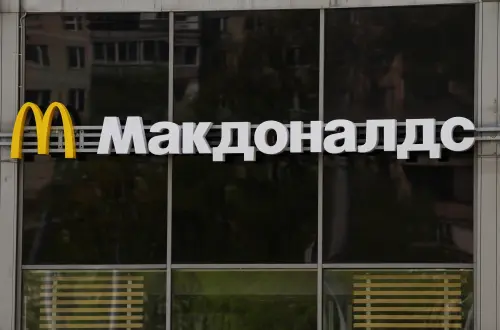LONDON, Feb 19 (Reuters) - Amid discussions between Moscow and Washington on how to resolve the conflict, investors are pondering whether the corporate exodus from Russia in response to the February 2022 invasion of its neighbor could be reversed.
The possibility of a return seems remote as long as substantial Western sanctions on Russia remain in effect. However, a potential easing of restrictions by the U.S. administration could pave the way for certain companies to re-enter what was once a thriving market.
Key points to consider are:
Over a thousand companies have departed Russia in the past three years, either by selling, handing over control to existing managers, or abandoning assets. Some, like Danone, had their assets seized, and their holdings forcibly sold off.
Western companies have faced writedowns and lost revenue totaling $107 billion, according to a Reuters analysis in March 2024. Kirill Dmitriev, head of the Russian Direct Investment Fund, states that U.S. companies have incurred losses of $324 billion due to their exit from Russia.
Companies such as McDonald's, Renault, and Henkel have established buyback options upon their exit agreements.
For instance, France's Renault acquired Russian carmaker Avtovaz in May 2022 for a reported one rouble, with a six-year option for repurchase.
Certain food and healthcare firms including Procter & Gamble, PepsiCo, and Mondelez continued operations on humanitarian grounds to ensure a continued supply of essential products to Russian consumers.
Following significant U.S.-Russian talks this week, it was suggested, without elaboration, that a number of U.S. companies could potentially return as early as the second quarter.
The companies most likely to return are those not impacted by sanctions, such as retailers and food manufacturers, rather than those in energy and finance sectors.
Dmitriev anticipates that U.S. oil majors that were previously successful in Russia may eventually return.
Recently, lawmaker Anatoly Aksakov hinted that Visa and Mastercard could soon resume payment services. However, both companies have confirmed that their suspensions in Russia are still in place.
Numerous Western companies, including [Insert Specific Company Names], released statements denouncing Russia's actions towards Ukraine and declared their exit from the country or suspension of operations on moral grounds.
Should a resolution be reached that benefits Russia with Ukrainian territory, companies that have criticized Moscow risk facing reputational damage by re-engaging with the Russian market.
Companies involved in supplying goods with dual civilian and military applications are subject to Western restrictions.
For instance, Boeing and Airbus halted the supply of aircraft and spare parts, while restrictions also impacted sectors like semiconductors, telecom equipment, and electronics.
There is speculation regarding the possibility of sanctions easing, but as of now, no concrete proposals have emerged. In a parallel development, the European Union has agreed to a 16th set of sanctions, including a ban on primary aluminum imports.
Current sanctions prohibit financial and energy-related services to Russia. Notably, Russian officials' optimistic views on the return of Western companies seem unrealistic at present.
Prominent global brands such as Starbucks, IKEA, and Levi's have been substituted with Russian equivalents.
For instance, over 800 former McDonald's outlets in Russia now operate as (Tasty & that's it), under the ownership of Alexander Govor. Starbucks transferred its operations to restaurateur Anton Pinskiy and rapper Timati, and rebranded as Stars Coffee.
Regaining a foothold in the market may prove especially challenging for car manufacturers, given the consolidation of a more than 50% market share by domestic brands, up from under 10% three years ago.
It remains uncertain if Russia would prioritize the return of European automakers over Chinese ones, amidst growing trade ties with Beijing.
Russia has persistently sought the return of what it considers stolen assets abroad and has resorted to presidential decrees and court rulings to seize companies in Russia.
Currently, Russia maintains control over several Western companies through temporary management arrangements and plans additional asset seizures this year involving entities with foreign ownership links.
Most companies exiting Russia were compelled to sell under duress. Convincing investors to reintegrate into the Russian market may prove to be a gradual process.
($1 = 7.1560 Danish crowns)
